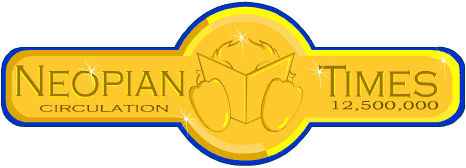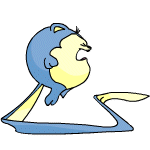 
|
|
The Life and Times of the Meerca by muas |
 |
|
Believe it or not, there are still great uncharted regions of Neopia that not even the bravest explorers have reached yet. It sure seems like we've explored it all - we even found Faerieland, just this year. But I am here to testify that, beyond the Mystery Island and Maraqua, there are other lands. Other islands, other buildings, and other towns. Even other animals no Neopian has ever seen before! How do I know this? I am - or was - one of those animals. A Meerca. The newest, and as yet, most mysterious NeoPets. Perhaps you don't recognize the name? Then this famous description of the Meerca, penned by popular reporter Jay Don Vee Kacheek the day we arrived, may jog your memory: "They're tiny little round balls of fluff that bounce around so fast you have to hold one down with both hands to get a good look at it. Long front teeth, wide eyes, and a pudgy, almost perfectly round body are the norm. They come in all colors - red, blue, yellow, and green, although the red looks more like purple. Their most distinguishing characteristic, the one that everyone has heard of, is their huge, long, lightning-like tails. They are amazingly friendly, an endearing characteristic to any Neopian; and finally, completing the puzzle which is the Meerca, they are smart. Yes, smart, even with the tiny body and even tinier brain!" Don Vee Kacheek's description is fairly accurate, even though he had only met his first Meerca - a yellow one named Grendel, whom he later adopted - that day. We Meercas were not discovered for years. We live far, far away, on the opposite end of Neopia, in a land known to Meercas as Glidobin. I feel that, as a Meerca myself, I am qualified to bring you information on us. Thus, I intend this as an article to illuminate, educate, and fascinate. Meerca Years vs. Neopian Years Meercas have the same life span as many NeoPets, but what does that mean, exactly? To establish a frame of reference, one month to a Meerca equals five years for a human, and every month after that is five years, as well. Thus, a Meerca reaches teenage years in just three months, and becomes an adult in five. Our life span is considerably greater; to a human, we live 200 years. Glidobin Glidobin, known as Forest Island to Neopians, is on the other side of the world of Neopia, exactly across from the main Neopian continent. It is a land full of trees - large bare spots are rare. That is why we developed our tails, you see - so that we can be just as much at home in trees as on the land. We are the most abundant animal in Glidobin, but not the only one. We share our beautiful home with bird-like animals (although a lot smaller than the Lenny), bugs (Yecch, we Meercas feel the same way about them as you do), and some very strange, exotic animals that you wouldn't have any frame of reference for. Glidobin is beautiful. Beautiful! The trees, of which there is an amazing variety, are deep brown and green; the ground is soft with a coat of fallen leaves; and in the Moving Time (you know it as autumn or fall), when the leaves slowly turn golden red and orange, you feel glad just knowing you have witnessed this amazing sight. The bare spots seem covered in a soft, glowing light, as well as beautiful green grass; it never gets too hot or too cold, even in Moving Time and Returning Time. Moving and Returning Time Whereas you Neopians have four seasons - Spring, Summer, Fall, and Winter - Meercas have two, Moving and Returning Time. For Spring and Summer, we live in clearings, eating abundantly and saving half of all we find. Berries, animals, and leaves are abundant and at their most tasty time in this season, which we call the Returning Time. Why is it called the Returning Time? Because in Fall and Winter, we are forced to move. We pack up all of our things, and head for the trees, where we live for six months. We do this because for six months, the worst part of Glidobin sets in. The Moniki come. The Moniki are a fairly recent development, but have not let up for years. They are big animals (big being relative - they're about the size of a Skeith) and live in our clearings. We have no idea what they do for the other six months, because all attempts to find them after that have failed, but they do return every six months and terrorize us if we come down from the trees. Returning Time Clearing life is easily preferable to tree life. In the time when we live in the clearing, there are the most animals and plants to feed on, the leaves are the tastiest (although we only eat leaves if we are desperate) and we feel much better. The Moniki are not there, and we can explore as far as we want to. All Meercas live in tribes; I, for instance, live in the Lanif tribe. Even after we came to Neopia, we remained members of our tribe, because distance does not change our bonds. Each tribe lives in a different clearing. Sometimes, small tribes will share a clearing if they cannot find one of their own, but no tribes ever split up or mix in with another unless times are truly desperate. We sleep on either leaves or in small tents we make with branches and wide leaves. Moving Time Tree life is very stressed out; everyone is nervous. We usually have enough food, because we horde it during the clearing time, but we're stuck up in the trees, and can't come down for anything! We do get to admire the pretty leaves up close, though. Coming to Neopia A lot of people are curious about how Meercas came to Neopia. Well, it is an interesting story. My brother, Blyjin, was never content to stay in one place at once. He kept roaming around, all day, every day. Then the Moving Time came, but he didn't stay in the tree! He snuck past the Moniki and went to his favourite place, by a spring. He was almost eaten! Luckily we found him in time, and he said he would stay up in the tree for the rest of the time...but he didn't. He snuck out one cold, dark night. I remember I was sleeping next to the trunk, on a big wide branch, all snug and warm, when suddenly I felt the branch shaking. "Bly, what're you doing?" I asked blearily, but got no reply. The next morning, he was gone. We all waited anxiously for his return, but he never came back...for five months, until the Moniki had left. We thought he had been eaten or gotten lost, and tried to move on, but he returned just after the Moniki left! We were all very happy, except...he brought some strangers with him. These strangers were Neopians, explorers. They found Bly, but left for a few months until they could gather supplies to come back. Now they had heard of the Moniki, and decided to offer us a better life in Neopia, in exchange for being pets. After a few quick meetings, it was decided. We would go live in the forest regions of Neopia, becoming pets to its users. And that is how we came to Neopia! Differences Between Meerca in Glidobin and in Neopia In Neopia, of course, the biggest difference is that we are pets. But we are given a lot of freedom by most of our owners, so it seems like the same as before. There's a lot more animals and people that we have had to adjust to. Plus the four seasons, the shorter life span of humans, the other predators (Pant Devil, anyone?), and the food! There's so much more variety of food here! I could spend days and days happily learning about all the different items. Plus, we get to release our pent-up energy in the Battledome. It turns out Meercas are great fighters, since we are so fast (or is that everyone else is really slow?) and learn so quickly. I spend my days with my owner, muas, and my brother, Klaue, training for the Battledome and exploring Neopia. I'll never forget Glidobin, but Neopia is now my home. |
|
|
|